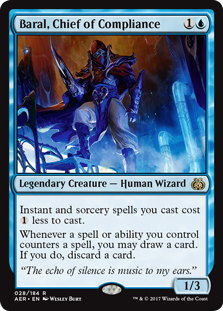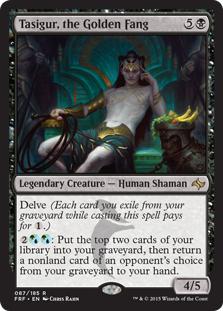Uncompetitive Spirit — 2HG EDH, OMG!
One of my favorite stories to come out of competitive Magic of all time is the success of Chris Lachmann and Jacob Van Lunen at Pro Tour San Diego in 2007. The format was Two-Headed Giant Time Spiral Booster draft and the two had come up with a very specific plan: force slivers. Apparently, most of the other players at the tournament undervalued the slivers strategy in the format, and the two were able to draft pretty much any cards they wanted for their decks. This in turn allowed them to create a nigh-unstoppable onslaught of fleshy meathooks, and they completely swept the tournament. Notable achievements were their ability to consistently killed opponents via poison counters thanks to Virulent Sliver, something which was very uncommon in a pre-Infect-Blazing Shoal era Pro Tour. In fact they did exactly this to Hall of Famers Jon Finkel and Dave Humphreys on their way to the top 4 and the eventual win of the entire tournament.
Part of what made this strategy work, however, has to do with the format itself: Two-Headed Giant. Thanks to the special rules of this format, Lachmann and Van Lunen were effectively casting their synergistic slivers twice as fast as a single player could have, making them a lot harder to stop. It is this special kind of Magic which I will discuss today: Two-Headed Giant in EDH!
At the end of this article, I shall also unveil my next project on this site, and I need your help to make it a success! So make sure you stay tuned and read on to the very end!
Two-Headed Giant, the Basics

The name of the format comes from the classic Alpha card Two-Headed Giant of Foriys, and the name is a good visualization of what the format actually is. Instead of having two powerful mages battling each other, we have two two-headed giants duking it out! In practice, this means many things for the rules, when applied to EDH:
- Players play in two teams of two instead of the four-player free-for-all that is customary for the format.
- Players within the teams are free to communicate and exchange information anytime and anyhow they want.
- Instead of each player starting with 40 life, each team starts with a total of 60 life. This life total is shared between the players, meaning that if a player controls a Phyrexian Arena the team will lose 1 life and the player who controls the Phyrexian Arena will draw a card at the beginning of the team's upkeep.
- Teams take their turns together, they share all phases and steps. They attack together and block together. You can elect to attack either the opposing team as a whole or a planeswalker controlled by either opponent. If an effect refers to the "defending player", the controller of that effect elects which opponent it applies to.
- After the blocks are declared and resolved as regular Magic, the creatures who are unblocked (or have trample and have excess damage to deal) assigns combat damage to either opponent. The controller chooses for each creature who deals damage to which opponent. For example: the controller of an unblocked Hypnotic Specter decides which opponent takes the hit, and only that opponent is forced to discard a card at random, not both opponents.
- Players lose life individually but the life loss is taken from the shared team life total. This means that effects that could effect for example "each opponent" effects both players on a team. For example, if a player casts a Gray Merchant of Asphodel, his enters the battlefield-effect will cause both opponents to lose life taken from the shared life total, and the controller's team would gain life from both opponents. In practice, Gray Merchant of Asphodel forces your opponent team to lose life equal to twice your devotion to black, and you gain life equal to twice your devotion to black - so that card in particular is extra good!
- If a team is dealt 21 total commander damage from a single commander, they lose the game.
- Other than life, teams share no resources between them. You can't give mana or permanents such as lands or cards in hand to your team mate.
- If an effect would cause a player to take an extra step, phase, or turn, the team gets to take an extra step, phase or turn. Be wary, this is extremely powerful in this variant, and players should probably leave their Time Warps in the bag.
- Players win or lose the game together, and the win condition and lose conditions are the same as in regular EDH - with the exception that a team needs 15 poison counters to lose rather than the usual 10, and of course, teams share poison counters as well. If a player has an effect that says "You win the game", that player's team wins the game. If a player has an effect that says "You lose the game", that player's team loses the game.
A lot of corner-cases are likely to crop up, but the Magic comprehensive rules have a section specifically dealing with Two-Headed Giant, so I refer you to that for any other details. Above is the basics you need to know to play most games of the variant.
OMG, why play 2HG EDH, Srsly?

There are a few reasons why you would want to play Two-Headed Giant EDH over the regular one:
- As with any variant I cover in this column, it's fun and mixes things up! Playing as part of a team creates a sense of unity, which doesn't happen in regular EDH.
- Two-Headed Giant EDH has the potential to be much faster than regular EDH, and since teams win or lose as teams and not individual players, there isn't any waiting around for the next game to start if you get knocked out.
- Two-Headed Giant EDH can be a learning opportunity for beginning players. Playing together with an experienced player who can coach you can be a step into the format which is, as we all know, rife with on-board interactions, politics, and other things that separate it from regular Magic.
- For you competitives out there: it will drastically increase your win percentage from, realistically speaking, 20%-30%, to a rough 45%-55% (note: this is a joke).
There are, of course, downsides to the format as well. If you think regular EDH is broken then you haven't seen half of it. A fast and powerful combo deck, say Sharuum the Hegemon, paired up with a powerful control deck like Baral, Chief of Compliance could probably destroy many other pairings. Take care when selecting decks for this variant, and make sure you aim to have fun above else.
Uncompetitive Arena: Tasigur, the Golden Fang!
This time, it's time for everyone's favorite oldschool khan-turned-traitor Tasigur, the Golden Fang to enter the Uncompetitive Arena and take a shot at Two-Headed Giant EDH! This is an old favorite of mine, I used to play him back when he was recently printed and one could have Prophet of Kruphix in the deck. Even without this particular piece of engine, Tasigur, the Golden Fang has a lot of potential to be a very powerful commander, as we shall see.

His average deck, according to EDHREC, looks like this:
I HAVE THE POWER!

From what we can gather in the list above, this is a pretty powerful deck, all things considered. It has the necessary mix of ramp spells and card draw, together with a suite of removal spells, countermagic, and then, disappointingly, a combo finish in the form of Palinchron and Dead-Eye Navigator who will generate infinite mana and allow Tasigur, the Golden Fang to go through the entire library and get it all in hand and then win via Torment of Hailfire or Villainous Wealth. I wouldn't recommend doing this in most EDH playgroups, and especially not in a game of Two-Headed Giant EDH, since even your team mate might feel cheated out of a game if you combo out the opposing team too early. Were I to play this deck in Two-Headed Giant EDH, I would probably cut some of the combo pieces (Villainous Wealth without infinite mana is fine, and quite fun I might add) and replace it with a bit more benign stuff. One of the best cards in the deck when I used to play it was, in my opinion, Sword of Feast and Famine since activating Tasigur the Golden Fang a couple of times, swinging and untapping, and then casting something you just returned or just passing with all your lands available is great. It belongs in the deck, I think.
The combo finish aside, the deck looks like a lot of fun in this variant. It's got the tools to play a supporting role to a more aggressive deck if needed, and it can threaten to go the distance with some of the more powerful cards, if supported by a more passive team mate, should need be. Banana man gets a recommendation!
New Article Series coming up!
With this installment of Uncompetitive Spirit concluded, I have two more pieces planned out, and then - what happens? Likely, we will close the book on format variants for this time around in a month, and I will move on to a new series. And for this to be a success, I need your help, dear reader. My new series is called General Medicine where I will take a look at your EDH deck, run it through our own EDHREC analysis, add some twists and turns of my own, and present your deck with an analysis for the world to see, right here on this site! Sounds exciting? Want your sweet brew featured (as in, picked apart, analyzed, and written about - it's not as scary as it might sound!) in my series? Here's what you do:
- Send an e-mail to edhrecdecksubmissions@gmail.com and make sure you include the following:
- An easy to read decklist. Links to the usual suspects (TappedOut, Deckstats, etc.) is fine.
- A short description of your deck - how does it play? How does it win? What are your favorite cards?
- A short description of where you want to go with the deck - is it competitive? 75%? Casual?
- If needed, a short description of your local metagame - are there any decks you're looking to beat?
- Sign it with your name, but let me know if you want to remain anonymous or use an alias.
- Hold on to your Krark's Thumb and hope that I will choose your deck!
- The series will premiere at the earliest in March, but the e-mail is open for submissions now! The more time I have to analyze your deck, the likelier it is that I will choose it! So get your submissions in now!
Until next time, stay awesome and keep it casual!
Your opinions are welcome. We love hearing what you think about Magic! We ask that you are always respectful when commenting. Please keep in mind how your comments could be interpreted by others. Personal attacks on our writers or other commenters will not be tolerated. Your comments may be removed if your language could be interpreted as aggressive or disrespectful. You may also be banned from writing further comments.
